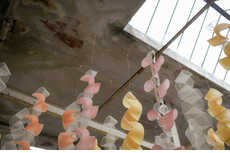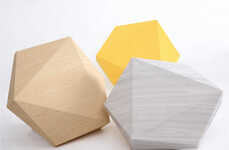
Heat-Sensitive Fabric Responds to Touch and Temperature
Noora Abu Eitah — September 12, 2008 — Art & Design
References: visualreferencestudio
The Touch Wall Panels by Visual Studio Reference are a series of modular three-dimensional panels that change color when touched or exposed to any form of heat.
The panels respond to the heat coming from the body, leaving a temporary print of the hand or shape of heat source.
Each panel is 24 by 24 inches, and is made of wood, foam and thermosensitive fabric.
Implications - In a society that is increasingly obsessed with the ability to personalize and customize any and all products, corporations can benefit from creating goods that react to consumers based on their mood or body temperature. By making the consumer feel like an individual (no matter how subtly) instead of a number, companies stand a better chance of creating long-term brand loyalty.
The panels respond to the heat coming from the body, leaving a temporary print of the hand or shape of heat source.
Each panel is 24 by 24 inches, and is made of wood, foam and thermosensitive fabric.
Implications - In a society that is increasingly obsessed with the ability to personalize and customize any and all products, corporations can benefit from creating goods that react to consumers based on their mood or body temperature. By making the consumer feel like an individual (no matter how subtly) instead of a number, companies stand a better chance of creating long-term brand loyalty.
Trend Themes
1. Personalized Interactive Products - Companies can benefit from creating goods that react to consumers based on their mood or body temperature, fostering long-term brand loyalty.
2. Customizable Sensory Experiences - The demand for products that can be personalized and customized to create unique sensory experiences is growing, presenting opportunities for companies to innovate.
3. Technology-driven Material Innovation - Advancements in materials such as thermosensitive fabric are enabling the creation of interactive products that can respond to touch and temperature, opening up new possibilities for product design.
Industry Implications
1. Home Decor - Integrating color-changing 3D wall panels into home decor allows consumers to add a touch of uniqueness and personalization to their living spaces.
2. Fashion - Incorporating heat-sensitive fabric into clothing and accessories can create interactive and customizable fashion items, giving consumers a unique style experience.
3. Hospitality - Hotels and restaurants can enhance guest experiences by incorporating heat-sensitive panels in their interiors, creating a dynamic and immersive atmosphere.
4.7
Score
Popularity
Activity
Freshness























